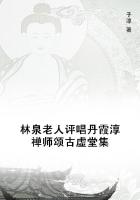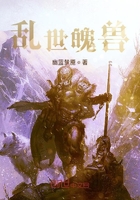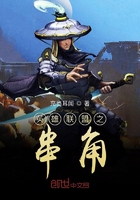"They do not come," he shouted again. "Shall we then sit here till we grow old?""No, father," they answered. "Begin! begin!""Let the Umkandhlu regiment come forward!" he shouted a third time, and as he spoke the black shields of the Umkandhlu leaped from the ranks of the impi.
"Go, my children!" cried Chaka. "There is the foe. Go and return no more!""We hear you, father!" they answered with one voice, and moved down the slope like a countless herd of game with horns of steel.
Now they crossed the stream, and now Zwide awoke. A murmur went through his companies; lines of light played above his spears.
Ou! they are coming! Ou! they have met! Hearken to the thunder of the shields! Hearken to the song of battle!
To and fro they swing. The Umkandhlu gives way--it flies! They pour back across the stream--half of them; the rest are dead. A howl of rage goes up from the host, only Chaka smiles.
"Open up! open up!" he cries. "Make room for the Umkandhlu GIRLS!" And with hanging heads they pass us.
Now he whispers a word to the indunas. The indunas run; they whisper to Menziwa the general and to the captains; then two regiments rush down the hill, two more run to the right, and yet another two to the left. But Chaka stays on the hill with the three that are left. Again comes the roar of the meeting shields. Ah! these are men: they fight, they do not run. Regiment after regiment pours upon them, but still they stand. They fall by hundreds and by thousands, but no man shows his back, and on each man there lie two dead. Wow! my father, of those two regiments not one escaped. They were but boys, but they were the children of Chaka. Menziwa was buried beneath the heaps of his warriors. Now there are no such men.
They are all dead and quiet. Chaka still holds his hand! He looks to the north and to the south. See! spears are shining among the trees.
Now the horns of our host close upon the flanks of the foe. They slay and are slain, but the men of Zwide are many and brave, and the battle turns against us.
Then again Chaka speaks a word. The captains hear, the soldiers stretch out their necks to listen.
It has come at last. "Charge! Children of the Zulu!"There is a roar, a thunder of feet, a flashing of spears, a bending of plumes, and, like a river that has burnt its banks, like storm-clouds before the gale, we sweep down upon friend and foe. They form up to meet us; the stream is passed; our wounded rise upon their haunches and wave us on. We trample them down. What matter? They can fight no more. Then we meet Zwide rushing to greet us, as bull meets bull. Ou!
my father, I know no more. Everything grows red. That fight! that fight! We swept them away. When it was done there was nothing to be seen, but the hillside was black and red. Few fled; few were left to fly. We passed over them like fire; we ate them up. Presently we paused, looking for the foe. All were dead. The host of Zwide was no more. Then we mustered. Ten regiments had looked upon the morning sun;three regiments saw the sun sink; the rest had gone where no suns shine.
Such were our battles in the days of Chaka!
You ask of the Umkandhlu regiment which fled. I will tell you. When we reached our kraal once more, Chaka summoned that regiment and mustered it. He spoke to them gently, gently. He thanked them for their service. He said it was natural that "girls" should faint at the sight of blood and turn to seek their kraals. Yet he had bid them come back no more and they had come back! What then was there now left for him to do? And he covered his face with his blanket. Then the soldiers killed them all, nearly two thousand of them--killed them with taunts and jeers.
That is how we dealt with cowards in those days, my father. After that, one Zulu was a match for five of any other tribe. If ten came against him, still he did not turn his back. "Fight and fall, but fly not," that was our watchword. Never again while Chaka lived did a conquered force pass the gates of the king's kraal.
That fight was but one war out of many. With every moon a fresh impi started to wash its spears, and came back few and thin, but with victory and countless cattle. Tribe after tribe went down before us.
Those of them who escaped the assegai were enrolled into fresh regiments, and thus, though men died by thousands every month, yet the army grew. Soon there were no other chiefs left. Umsuduka fell, and after him Mancengeza. Umzilikazi was driven north; Matiwane was stamped flat. Then we poured into this land of Natal. When we entered, its people could not be numbered. When we left, here and there a man might be found in a hole in the earth--that was all. Men, women, and children, we wiped them out; the land was clean of them. Next came the turn of U'Faku, chief of the Amapondos. Ah! where is U'faku now?
And so it went on and on, till even the Zulus were weary of war and the sharpest assegais grew blunt.















